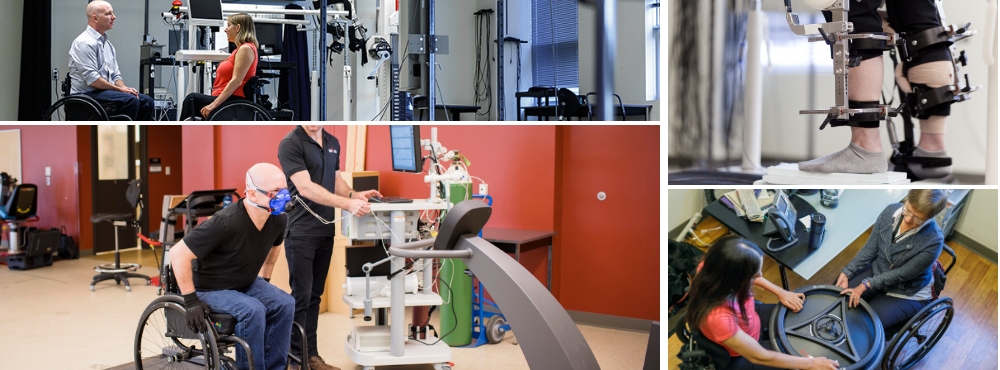Centre for Bioengineering and Biotechnology (CBB) Praxis Grant Competition

STAGE One Workshop - June 18, 2021 1 - 4 p.m.
Information for Stage 1 can be found at the bottom of this page.
STAGE Two Grant Competition
Objectives of Stage Two (2):
A student, Postdoctoral Fellow, Faculty or Staff from the University of Waterloo that has the most promising innovative project to improve the lives of individuals with spinal cord injury (SCI) will be selected from a pool of applicants and supported as follows.
-
$17,500 CAD for first place; $10,000 CAD for second place;
-
Business planning in parallel with R&D;
-
Coordination ofan application for Mitacs funding.
Preference will be given to applications that incorporate a lens of indigenous challenges or indigenous participants.
Expectations and Terms of Funding:
-
Identify a pressing challenge for individuals with SCI (preference given to projects that highlight accessibility and cultural considerations to appropriately incorporate and meaningfully engage Indigenous leaders, faculty, community, students);
-
Develop a prototype;
-
Create a spin-out company;
-
Funds will support the company for six months and accelerate development;
-
The spin-out will send a report to the Centre for Bioengineering and Biotechnology (CBB) and Praxis outlining progress on key metrics (e.g. minimum viable product progress, business plan draft, pilot data on the technology R&D, patent, incorporation, etc.);
-
A final report will be submitted at the end of six months;
-
The spin-out company will apply for Velocity and later Praxis’ Accelerator for continued support.
Applicant demographic:
Any member or member team of the UW Community: student, postdoctoral fellow, faculty or staff. Partners external to the University of Waterloo are not required, but are encouraged.
Application process:
Please email cbb@uwaterloo.ca with a (i) maximum two page (ii).docx or .pdf file (iii) addressing the following #1-12.
Applications will be accepted until August 18, 2021 at 11:30 pm; the successful applicant(s) will be announced on August 25, 2021.
-
Name, title, affiliation, email and phone number of the applicant(s)
-
What is the problem or issue being addressed for the population suffering from spinal cord injuries? (e.g. Neuropathic pain, Neuro-restoration, Bladder and Bowel related complications, Sexual function, Pressure injuries, Quality of Life, Independent Living, Other – please specify)
-
How does your solution meaningfully engage and incorporate the challenges in healthcare accessibility and cultural sensitivity with regards to the Indigenous community in Canada? How have you engaged with these challenges and communities? What is your plan to do so?
-
What is the potential impact of the technology?
-
What is your technology’s TRL? (Technology Readiness Level – Innovation)
-
Explain what makes your product unique in the market in one sentence.
-
What other markets (types of patients, diagnoses) will your product benefit?
-
Will you or have you patented/copyrighted your technology?
-
Do you plan to spin-out your technology into a start-up company? How will you achieve this goal?
-
What is your strategy for seeking subsequent support?
-
What are the three (3) key objectives of your technology development and company creation in Fall 2021 (e.g. commercialization consultation, end-user consultation, research and product development, incorporation, patenting, Velocity membership, validation, pilot, etc.)
-
What do you need help with over the funding period? Prioritize the answers below by giving them a score from 1-7 (do not repeat)
-
Validation, engagement, and traction with end-users (SCI community)
-
Research expertise, advisory and networks
-
Business planning
-
Introduction to Business-Busines buyers in the US and Canada (hospitals, insurance providers, payers)
-
Regulatory and reimbursement advice
-
Exposure to angel and VC investors in the US and Canada
-
Other, please elaborate
-
Indigenous SCI Grant Competition - Stage 1
June 18, 2021 1 - 4 p.m.
This will be a half day workshop featuring team building sessions and talks on Indigenous and Spinal Cord Injury challenges. Participants can submit their solutions, after the workshop, for a chance to win one of eight $2,250 CAD grants to develop their idea.
Project applications are due July 14, 2021 by 11:50 p.m. to cbb@uwaterloo.ca. Applicants will be notified by July 22, 2021.
Eligibility: Any member of the University of Waterloo community that attended the June 18th workshop, or a group that has at least one community member
Application detail: Any format that conveys your idea (poster, pamphlet, video, slide deck, word document). We are looking for an explanation of your cancept, what you have done, what you plan to do and that you have incorporated concepts delivered during the workshop. You will not be judged on your presentation, only the viability of your idea.
Grant detail: Funds to be spent by February 28, 2022, report will be due March 31, 2022. More details to be shared with awarded projects.
The Fundamentals of OCAP
Take the Fundamentals of OCAP course by the First Nations Information Governance Centre and be reimbursed by CBB.
Submit your proof of payment with a completed Expense Claim Form to cbb@uwaterloo.ca by December 10, 2021